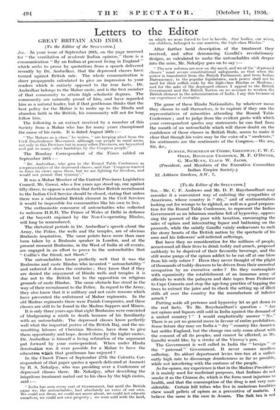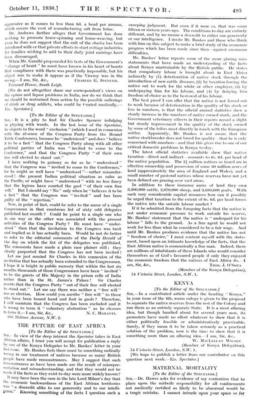[To the Editor of the SPECTATOR.] SIR,—Mr. C. F. Andrews
and Mr. D. P. Raychaudburi may consider it a convenient way of enlisting the sympathies of Americans, whose country is "dry," and of sentimentalists looking out for wrongs to be righted, as well as a good prepara- tion for the Round Table Conference, to represent the Indian Government as an inhuman machine full of hypocrisy, oppres- sing the poorest of the poor with taxation, encouraging the sales of opium and intoxicating liquor and battening on the proceeds, while the saintly Gandhi vainly endeavours to melt the stony hearts of the British nation by the spectacle of his own and his followers' self-inflicted sufferings.
But have they no consideration for the millions of people, accustomed all their lives to drink toddy and arraek, proposed suddenly to be deprived of their favourite beverage, and the still worse pangs of the opium addict to be cut off at one blow from his only solace ? Have they never thought of the plight of thousands of toddy-drawers to be driven from their ancestral occupation by an executive order ? Do they contemplate with equanimity the establishment of an immense army of officials to watch the palmyra and date topes from Peshawar to Cape Comorin and stop the age-long practice of tapping the trees to extract the juice and to check the setting up of illicit stills all over the country for the manufacture of inferior arrack ?
Putting aside all pretence and hypocrisy let us get down to the real facts. To Mr. Raychaudhuri's question : "Are not opium and liquors still sold in India against the demand of a united country ? " I would emphatically answer "No." There is as yet no general move in favour of entire prohibition. Some future day may see India a" dry" country like America but unlike England, but the change can only come about with the consent of all its peoples, and cannot be effected, as Mr. Gandhi would like, by a stroke of the Viceroy's pen.
The Govermnent is well called in India the "benign" or the " paternal " Government. It never causes needless suffering. Its abkari department levies tree-tax at a suffici- ently high rate to discourage drunkenness as far as possible, while not interfering with the customs of the people.
As for opium, my experience is that in the Madras Presidency it is mainly used for medicinal purposes, that Indians do not smoke it as the Chinese do, which is the form most injurious to health, and that the consumption of the drug is not very con- siderable. Certain hill tribes who live in malarious localities chew small pellets of opium as a preventive of malaria. I believe the same is the ease in Assam. The -Salt tax is not _
oppressive as it comes to less than 6d. a bead per annum, which covers the cost of manufacturing salt from brine.
Mr. Andrews further alleges, that Government has done nothing to promote home-spinning and home-weaving, but even he does not suggest that the cull of the charka has been interfered with or that private efforts to start cottage industries for families wishing to add to their daily joint earnings have been discouraged.
When Mr. Gandhi propounded his tests of the Government's (image of heart" he must have known in his heart of hearts that compliance with them was practically impossible, but his object was to make it appear as if the Viceroy was in the wrong.—! am, Sir, &c., CIIARLES G. SPENCER. Tancood House, South Leigh.
[We do not altogether share our correspondent's views on the opium and liquor problems in India, nor do we think that we should be restrained from action by the possible sufferings of drink or drug addicts, who could be rcated medically.— En. Spectator.]









































 Previous page
Previous page